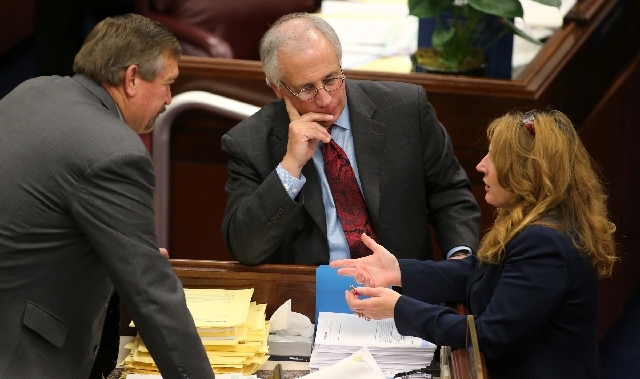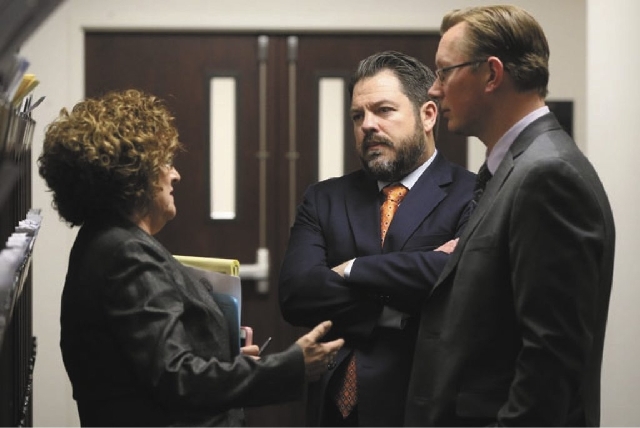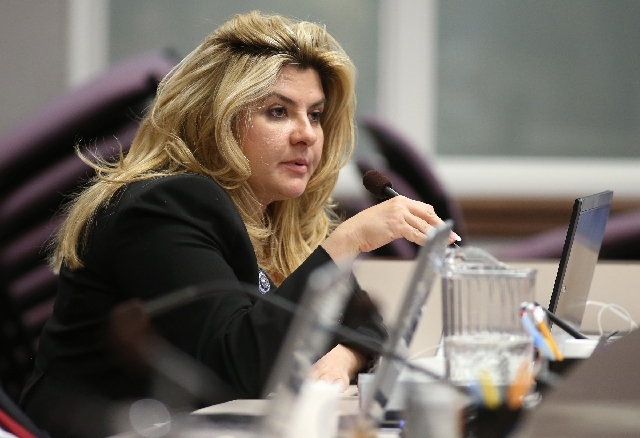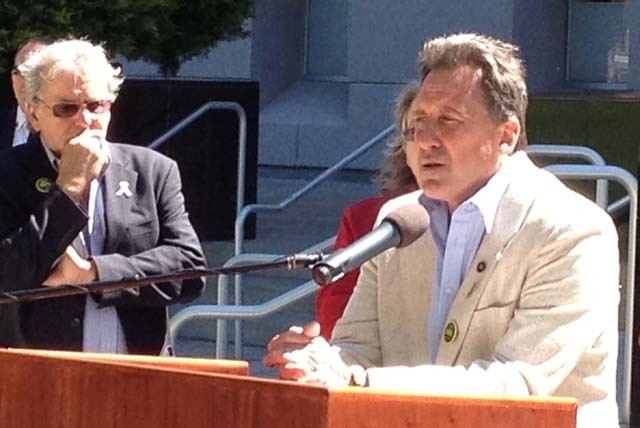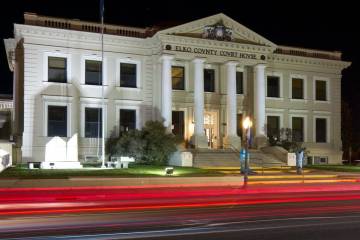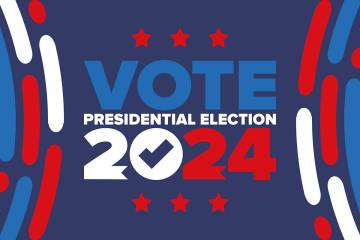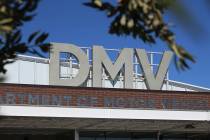Nevada gun, marijuana bills pass, More Cops tax hike fails as Legislature adjourns
CARSON CITY — A hectic final day in the Legislature on Monday saw bills mandating background checks on gun sales and establishing medical marijuana dispensaries eke out narrow but final legislative victories.
But the gun check bill faces a veto threat from Gov. Brian Sandoval, and he has not yet taken a position on the marijuana measure.
Also seeing final approval were bills helping the financially ailing city of North Las Vegas provide police and fire protection, allowing the Clark County Commission to impose a gas tax increase for roads, and establishing a four-year program of tax credits to lure film companies to Nevada.
An effort to approve a bill authorizing the Clark County Commission to raise the sales tax to provide more funding for police failed as the clock ran out of the 2013 session.
Other measures also failed, including a school choice bill sought by Sandoval to give tax breaks to Nevada businesses that donate to scholarships for low-income children to attend private schools.
Secretary of State Ross Miller acknowledged his proposal to move to electronic poll books at polling locations, including photos of voters, would not pass.
CONTENTIOUS GUN BILL
One of the most contentious bills of the day was Senate Bill 221, sponsored by Sen. Justin Jones, D-Las Vegas, to require background checks on private gun sales.
The bill appeared dead early Monday, but in an unexpected move, the Assembly Judiciary Committee approved it on a 7-5 vote.
The full Assembly then voted 23-19 to send it to Sandoval despite his promise to veto the measure. Four Democrats joined with all 15 Republicans in opposing the measure.
The bill previously passed the Senate on an 11-10 party-line vote with Democrats in support.
The Assembly debate saw strong comments on both sides of the issue.
In speaking for the bill, Assemblyman David Bobzien, D-Reno, acknowledged the bill won’t stop all gun violence.
“I believe in the use of firearms for protection,” he said. “Guns are, and always will be, a part of our way of life in this state. But we can’t let the perfect be the enemy of the good.”
But Assemblyman Ira Hansen, R-Sparks, said the measure is feel-good gun control legislation that will only affect law-abiding gun owners.
Assemblyman Richard Carrillo, D-Las Vegas, voted against the measure, doing so he said in reaction to pressure to support the bill. The 120th day of the session was not the time to act on the bill, he said.
The bill drew attention from around the country.
The group Mayors Against Illegal Guns, formed in 2006 to advocate against gun violence, lobbied heavily for the bill.
The organization, co-chaired by New York City Mayor Michael Bloomberg and Boston Mayor Thomas Menino, brought relatives of victims of the mass shootings in Newtown, Conn., Aurora, Colo., and Tucson, Ariz., to the capital to support the bill.
MARIJUANA DISPENSARIES
While not as contentious, the vote to move forward with a medical marijuana dispensary system in Nevada was dramatic in its own right.
Senate Bill 374 needed a two-thirds vote for passage and will now go to Sandoval for his consideration after the Senate considers a few minor amendments to the measure.
In an initial Assembly vote on the bill, two Democrats voted with 14 Republicans to oppose the measure, sending it to defeat because it needed a two-thirds majority.
But one of those voting no, Majority Leader William Horne, D-Las Vegas, said he did so only because of a glitch on the vote board that showed the measure failing. By voting on the prevailing side he could bring the measure back for reconsideration.
The bill was reconsidered and passed 28-14 with all Democrats and Assemblywoman Michele Fiore, R-Las Vegas, voting yes.
The dispensaries are intended to fill a gap in the state’s voter-approved medical marijuana program.
The bill would allow as many as 40 dispensaries to operate in Las Vegas, but only with proper oversight.
Sen. Tick Segerblom, D-Las Vegas, who sponsored the bill, said he was pleased with the vote and was optimistic that Sandoval will sign the bill. He said he nearly had a heart attack with the first vote showing it failing.
Voters approved a medical marijuana program in 2000, putting it in the state constitution. Nevadans can currently pay a $150 fee and get a physician’s signature for a card authorizing them to use marijuana for medicinal purposes, but there is no easy avenue to obtain the product.
Individuals have to grow their own or acquire it from a caregiver.
About 3,785 Nevadans have medical marijuana cards.
Segerblom has said in prior testimony that this situation has created legal problems for growers who can be arrested by police for illegal cultivation.
NV ENERGY BILL
Another controversial measure seeing approval late in the day was Senate Bill 123, which passed the Assembly on a 31-10 vote after a spirited debate. It already passed the Senate on a unanimous vote.
The bill requires NV Energy to divest itself of 800 megawatts of coal-generated energy by the end of 2019 and replace it with 350 megawatts of electricity generated by renewable sources and 550 megawatts of natural gas or other sources of electricity.
During the debate, Hansen contended the bill removes some of the regulatory power that the Public Utilities Commission now holds over NV Energy and could lead to higher utility rates. He said he wanted to protect the “little people” and that more time should be spent on proposals to bring cleaner energy.
Hansen said a PUC employee had been blocked from attending hearings on the bill and questioned whether U.S. Sen. Harry Reid, D-Nev., played a behind-the-scenes role to get the bill passed.
“I am hugely skeptical of a big giant corporation and one of our biggest monopolies,” he said. “The people don’t have a lobbyist.”
But Bobzien said the PUC still has power over future power contracts and expressed his concern about making sure Nevadans have clean air.
“I am concerned about the health impact of coal,” he said. “This is about planning for the future.”
Sandoval has already expressed support for the bill.
TAX CREDIT FOR FILMS
Sen. Aaron Ford, D-Las Vegas, pushed through Senate Bill 165 creating a four-year pilot program of tax credits for companies that film in Nevada.
Ford said the $20 million a year in tax credits would be a good start to establishing a film industry in Nevada.
Assembly Bill 503, which would let North Las Vegas tap into an enterprise fund designated for the repair and upkeep of the city sewer system to fund police and fire services, saw final passage as well.
So was Assembly Bill 506, implementing a settlement between the state Tax Department and the gaming industry over comped meals. The agreement will end the taxing of comped meals and eliminate a potential $233 million liability to the state.
Assembly Bill 496, known as the More Cops measure, was in play until the very end of the session. But the Senate could not finalize an agreement with the Assembly on the measure.
Legislative leaders appealed to the governor to call a special session to act on the cops bill, but no decision had been reached at 12:30 a.m. Tuesday as legislators remained in their seat waiting a decision.
The bill would have let the Clark County Commission, with a two-thirds vote, increase the sales tax from the current 8.1 percent to 8.25 percent to raise more revenue for police.
The Senate limited the increase to four years.
The tax increase would have generated an estimated $34 million in the nine months of the 2014 fiscal year and more than $46 million in the following three full fiscal years for the various police agencies in Southern Nevada.
The Metropolitan Police Department, which serves the city of Las Vegas and unincorporated areas of the county, would get 73 percent of the new revenue.
Clark County Sheriff Doug Gillespie said in previous testimony the additional tax revenue would allow him to fill a $30 million hole in his budget and ensure 300 current police officers continue to patrol the streets of Southern Nevada.
Sandoval had planned to sign the tax hike bill because voters approved the increase.
The other tax bill, Assembly Billl 413, to allow the county to impose a gas tax increase to allow the Regional Transportation Commission to build roads, passed just before the midnight deadline.
Assembly Bill 413 allows the county to “index” or increase gas taxes by the rate of inflation in the road construction industry, expected to be 3 cents per gallon per year.
Scores of bills have been sent to Sandoval in the final days of the session. He will be signing or vetoing them over the next several days.
Capital Bureau Chief Ed Vogel contributed to this report. Contact Capital Bureau reporter Sean Whaley at swhaley@reviewjournal.com or 775-687-3900.



